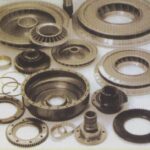What Happens if You Shift from 5th Gear to 1st?
All drivers have wondered at some point and time what happens if you shift from 5th gear to 1st. That too while traveling at higher speeds. Some people might have experimented with this also.
In this article, we will try to uncover the ramification of this act. We will systematically present our findings, guiding you in great detail as to what happens if you shift from 5th gear to 1st.
What Happens if You Shift from 5th Gear to 1st
If you shift from the 5th gear to the 1st, it will usually damage your gearbox, transmission drive shafts, and some components of the engine. It will cost you about $5.000 to repair these damages.

Common thinking is that gear shifting only has to do with the transmission. Hence, if you make such a disastrous shift then it will only damage the gearbox and associated components like the clutch.
But that is not the case. Car enthusiasts all over the world have experimented to accurately know the consequences of shifting from 5th gear to 1st gear. So, that you and me don’t have to jolt our cars.
One more thing that I want to clarify in the beginning is that we are not talking about automatic transmission cars over here. I know that they too have a D (High gear) and L (Low gear). Or in some cars, you have D, D1, D2, and D3.
Shifting between these gears does have certain consequences, but they are not very significant. As the final gear shifting takes place through a series of mechanisms.
Therefore, we will consider the gear shifting in manual transmission only. This is where the driver has all control in his hand. He will have to pay the price of moving the gear stick in the wrong direction.
I’ll take you through the stepwise repercussions your car will face if you shift from 5th gear to 1st while driving at high speed.
Also read: 8 Cars that Look Like Mustangs (But are Cheaper)
1. The First Damage will be to Your Clutch
Clutch is the head of your engine transmission. It is primarily responsible for engaging and disengaging gears. When you shift from 5th gear to 1st gear then there is a chance that clutch plates will wear out due to sudden pressing at very high speeds.
If you allow me to put it simply, then consider this. A grinding disc is rotating on a shaft at a very high speed. If you have to shift its position a few inches to either side with another disc. Then it is evident that both discs will wear out due to rubbing.
But if you have to shift it more than a few inches, say half a foot then the time of rubbing between both discs is extended. The higher the speed, the higher the friction. Hence, more damage to the discs.
The same is the scenario with clutch plates. For shifting from 5th to 1st gear they have to rub against each other for longer intervals and that too at extremely high speed.
So, there is a chance they might wear out instantly. However, if the vibrations increase you might even experience a complete failure of the clutch.
2. Then There can Be a Gearbox Breakdown
The clutch is only a messenger, the components that actually act upon its message are the gears. When you shift from 5th to 1st gear, the system that is damaged next after the clutch is the gearbox.
Gears are one part that will be damaged if you shift from 5th to 1st gear. The reason why I say this is because when a gear rotating at high speed is engaged with a gear rotating at low speed then you can imagine what would happen.
The tooth of at least two mating gears will be damaged. When a gear rotating at 3000 rpm mates with a gear rotating at 500 rpm then it is bound to happen.
Trending Video: How to Easily Bring Back to Life any Old Car Battery and Save Tons of Money (click to watch)
While sudden movements of gear it is possible that they might hit other sprockets on the way, damaging their tooth as well.
Several other bearing, locks, and seals come about to form a gearbox. These vibrations, sudden movements, and jerks can lead to their failure as well.
The sudden jerk when two gears meet each other can even cause the breakdown of the entire gearbox. In which case you will have to replace the complete transmission.
Also read: Can a Car Last 500k Miles? (+6 Cars that Do)
3. The Transmission Drive Shafts might Fail
There are a number of shafts present in the engine, but the majority of those are present inside the gearbox. With input and output drive shafts being the most critical. The enormous vibration produced as a result of a sudden shift between 5th and 1st gear can cause these shafts to fail.
The power between engine and transmission is shifted via gears. But these gears are fastened on the shafts. As explained above that mating between high and low-speed gears can produce jerks and vibrations.
These jerks can also be felt by the drive shafts. Depending upon the details, there is a high chance that drive shafts will fail or at least develop some cracks. These cracks will propagate as you keep driving, ultimately causing the complete failure of the shaft.
4. The Core Components of Engine Will Feel the Blow
The possibilities of engine damage when you shift from 5th to 1st gear are endless. You can very well understand that a microsecond delay in the transmission of power can disrupt the entire engine cycle. Negatively impacting the movement of crankshaft, connecting rods, and pistons.
The shock of shifting between 5th and 1st gear is huge. It will be felt by the entire chain of power delivery. Engine is the first link that is affected by it in the worst way possible.
If we said that gearbox, transmission shafts, and clutch will be damaged as they have a lot of moving parts. Then understand that the engine head has the highest number of moving parts.
That’s why here the possibility of damage is endless. The engine valves might be affected, which are responsible for intake and exhaust strokes.
Their timing will be disturbed in the least. The timing of valves is a highly sensitive issue. That directly impacts the factors like emissions and fuel mileage. Similarly, the timing belt or chain can be damaged as a result of this.
The core engine components like piston, crankshaft, and connecting rods might feel the jerk caused by this sudden shifting. If any of these components fail, then you can say goodbye to your engine.
How Fast Do You Need to Drive for This to Happen?
Pretty fast I would say. If you want all the things mentioned above to happen then your speed should be more than 100 kmph or 60 mph.
From a mechanical point of view, 5th gear offers very high rpm’s and low torque. So, if we consider that you were going in 5th gear before you accidentally shifted to 1st gear. Then it is evident that you were driving at least above 80 kmph.
Even in automatic cars, 5th gear is engaged when you are traveling near the 100 kmph mark.
The speed below which you would hardly feel any consequences is 50 kmph. Because this is the usual speed for 2nd gear. It sometimes overlaps with the range of 1st gear as well, when drivers are looking to accelerate quickly.
Also read: 10 Cars Under $20K that Look Like They’re for $50K+
How Much Does it Cost You if You Shift from 5th Gear to 1st?
This little maneuver can cost you as high as $5,000, with the prayer that the complete engine hasn’t failed. If that’s the case, I would suggest you sell your car to a scrap yard and buy yourself a new one.
If you are lucky enough, you might get away with losses of $500 to $800. Provided that only minor parts like clutch plates, one or two gears, a bearing, or a seal have been damaged.
If we follow in the similar order in which we described the consequences of shifting from 5th gear to 1st then the outcome would be:
- If the clutch is damaged:
There can be partial or complete damage to the clutch if you shift from 5th gear to 1st. If only the clutch plates wear out then it will cost around $200. But in case the whole clutch fails. The replacement of a complete clutch will cost you between $500 and $700.
- If the gearbox breaks down:
Again this can possibly have a lot of outcomes. Maybe a single sprocket is damaged, or maybe two have failed. Replacement of a single gear will cost you $250. Similarly, you can calculate your loss according to the number of gears damaged.
However, there is always a possibility of complete transmission breakdown. In which case, you will have to bear the cost of complete transmission replacement. That would be between $1,200 and $2,000.
There are a number of small components like bearing, seals, etc. that can also fail. Their replacement cost will be under $200.
- If the drive shafts fail
This is one thing which needs to be replaced if it gets damaged. Output and input shafts of the engine are highly critical components. Even the slightest of cracks on their surface cannot be tolerated.
So, if damage progress to the extent of engine transmission shafts, then it would cost you $300 – $750.
- The Core Components of Engine Will Feel the Blow
The components that are at the highest risk of failure are rings pistons and their seals. If any of these parts fail then the cost of replacement can rise between $1,000 and $5,000 depending upon the make and model of your car.
Similarly, a timing chain or belt will cost you $300 to $500.
The engine valves are also one expensive replacement. Though the part itself costs only $100, the labor cost is above $1,000.
References:
se.pl, autoservicecosts.com, gearboxanddiffshop.com.au, lubemobile.com.au, familyhandyman.com, theglobeandmail.com, quora.com,






